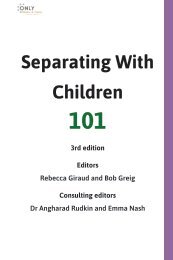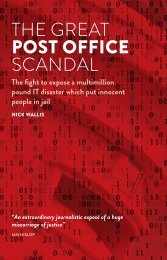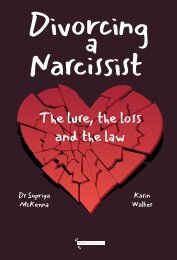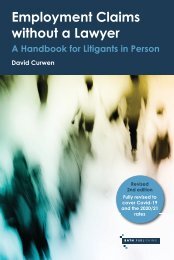The 'Secret' Family Court: Fact Or Fiction?
For approaching two decades, family courts have been accused of making life changing decisions about children and who they live with made in secret, away from the scrutiny of the public gaze. Recognising the force of these accusations, senior family courts judges have, over that time, implemented a raft of rule changes, pilot projects and judicial guidance aimed at making the family justice more accountable and transparent. But has any progress been made? Are there still suspicions that family judges make irrevocable, unaccountable decisions in private hearings? And if so, are those suspicions justified and what can be done to dispel them? In this important and timely new book, Clifford Bellamy, a recently retired family judge who has been at the sharp end of family justice during all these changes, attempts to answer those questions and more. He has spoken to leading journalists, judges and academic researchers to find out what the obstacles to open reporting are – be they legal, economic or cultural - and interweaves their insights with informed analysis on how the laws regulating family court reporting operate. Along the way he provides a comprehensive review of the raft of initiatives he has seen come and go, summarises the position now and uses this experience to suggest how this fundamental aspect of our justice system could adapt in the face of this criticism. Every professional working in the family justice system – lawyers, social workers, court staff and judges - as well as those who job it is to report on legal affairs, should read this informative, nuanced exposition of what open justice means and why it matters so much to those whose lives are upended by the family justice system.
For approaching two decades, family courts have been accused of making life changing decisions about children and who they live with made in secret, away from the scrutiny of the public gaze. Recognising the force of these accusations, senior family courts judges have, over that time, implemented a raft of rule changes, pilot projects and judicial guidance aimed at making the family justice more accountable and transparent.
But has any progress been made? Are there still suspicions that family judges make irrevocable, unaccountable decisions in private hearings? And if so, are those suspicions justified and what can be done to dispel them?
In this important and timely new book, Clifford Bellamy, a recently retired family judge who has been at the sharp end of family justice during all these changes, attempts to answer those questions and more. He has spoken to leading journalists, judges and academic researchers to find out what the obstacles to open reporting are – be they legal, economic or cultural - and interweaves their insights with informed analysis on how the laws regulating family court reporting operate. Along the way he provides a comprehensive review of the raft of initiatives he has seen come and go, summarises the position now and uses this experience to suggest how this fundamental aspect of our justice system could adapt in the face of this criticism.
Every professional working in the family justice system – lawyers, social workers, court staff and judges - as well as those who job it is to report on legal affairs, should read this informative, nuanced exposition of what open justice means and why it matters so much to those whose lives are upended by the family justice system.
You also want an ePaper? Increase the reach of your titles
YUMPU automatically turns print PDFs into web optimized ePapers that Google loves.
<strong>The</strong> ‘Secret’ <strong>Family</strong> <strong>Court</strong> – <strong>Fact</strong> <strong>Or</strong> <strong>Fiction</strong>?<br />
law systems…Consequently…the exclusion of the public from proceedings<br />
has objectively to be justified. It is not good enough for it to<br />
be said that we have always done it this way so it has to be right. That<br />
principle of open justice applies to all courts and in principle the family<br />
courts are not excluded from it, although for good reasons which I<br />
shall set out later, many family cases…require confidentiality.”<br />
Open justice comprises two key components. <strong>The</strong> first is the right of the<br />
media and the public to be present in court to observe justice being done.<br />
<strong>The</strong> second, which follows naturally from the first, is the right of those who<br />
are the subject of the judicial process to discuss their experiences, freely and<br />
openly, outside court. In the <strong>Family</strong> <strong>Court</strong>, both of these rights have been<br />
severely circumscribed by a mixture of practice, statute and rule. If such restrictions<br />
are lawful, that raises two very important questions for the family<br />
justice system. First, what does ‘open justice’ mean? Second, what are its<br />
limits? Our understanding of open justice and of the limits of open justice<br />
are central to the issues with which this book is concerned.<br />
In 2014 an authoritative analysis of the principle of open justice was given<br />
by the Supreme <strong>Court</strong>. 5 It is appropriate to quote from the judgment of<br />
Lord Reed at some length:<br />
“23. It is a general principle of our constitutional law that justice is<br />
administered by the courts in public, and is therefore open to public<br />
scrutiny. <strong>The</strong> principle is an aspect of the rule of law in a democracy…society<br />
depends on the courts to act as guardians of the rule of<br />
law…<br />
25. <strong>The</strong> principle that courts should sit in public has important implications<br />
for the publishing of reports of court proceedings…[It] is by<br />
an application of the same principle that it has long been recognised<br />
that proceedings in open court may be reported in the press and by<br />
other methods of broadcasting in the media…<br />
26. <strong>The</strong> connection between the principle of open justice and the reporting<br />
of court proceedings is not however merely functional. Since<br />
the rationale of the principle is that justice should be open to public<br />
scrutiny, and the media are the conduit through which most members<br />
of the public receive information about court proceedings, it follows<br />
that the principle of open justice is inextricably linked to the freedom<br />
5<br />
A v British Broadcasting Corporation (Scotland) [2014] UKSC 25 – see in particular paragraphs<br />
23-41.<br />
12













